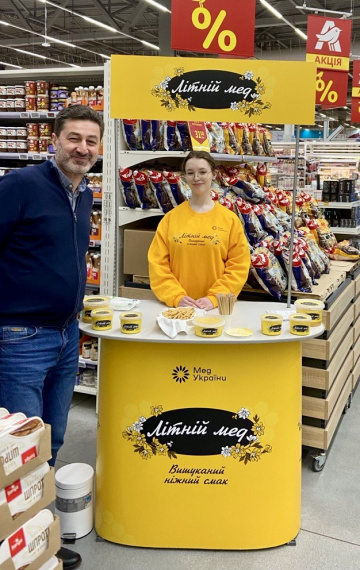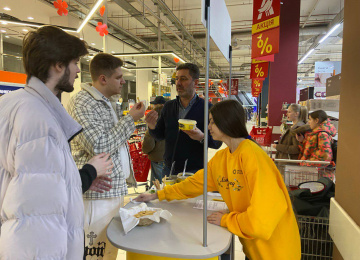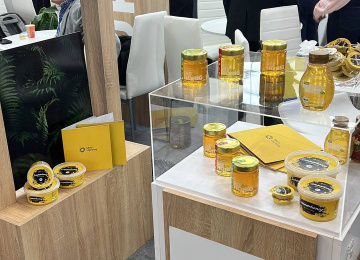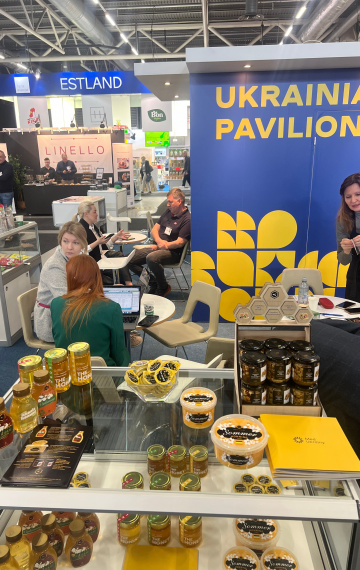Ukrainians have long valued organic honey, fresh from the hive, but European consumers have not been very familiar with such Ukraine-made products for quite a while. Even organic Ukrainian honey produced to the strictest European standards struggled to reach European supermarket shelves, because beekeepers lacked experience and knowledge to navigate the complex certification, processing, packaging, and export procedures that were required by the EU.
Sweet export
Things began to change only in the early 2010s when companies specialising in processing honey emerged, in particular Organic Export, which was established in 2013 and is now one of the largest players in the Ukrainian honey market.
The honey that Ukrainians are used to buying from friends or at farmers’ markets is seen by foreign consumers as an unprocessed product or even a raw material. Europeans are not accustomed to eating honey that comes directly from the beehive. When they buy a jar of their favourite honey at the supermarket, they expect the same taste, texture, and colour each time.
But ensuring such consistency is challenging for private beekeepers, says Eduard Krychfalushiy, the founder and director of Organic Export.
“(Ensuring consistency) requires an absolutely different approach: in terms of technology, quality monitoring, blending, and therefore, accumulating warehouse stocks of raw material,” he says.
“In some ways, honey as a product is as complicated as wine.”
By 2022, Organic Export had become one of the leading Ukrainian honey exporters. The company spent almost 10 years developing its distribution network, directly contracting over 3,500 beekeepers in Ukraine to supply raw honey. It created one of the best and most advanced laboratories for monitoring honey quality in the country, and established its own processing and filling lines, primarily exporting honey as a raw material.
However, the war has significantly complicated the company’s work.
Seizing opportunities
Located in the Brovary district close to the Ukrainian capital Kyiv, the company’s premises were fortunately not directly hit by missiles or shells. Nevertheless, it suffered broken windows and destroyed engineering infrastructure caused by strikes nearby.
The company was more significantly affected by the loss of numerous suppliers trapped under occupation, as well as products that were lost when en route to supermarkets in eastern regions.
“Our biggest challenge was destroyed logistics,” Krychfalushiy explains. “We’ve lost access to the sea, and land transport has slowed down significantly. As a result, delivery time to clients has increased by 30-60 days compared to pre-war levels. This caused a catastrophic lack of liquidity; we had to almost instantly double our working capital.”
On the other hand, access to European supermarket shelves has become much easier, as major EU retail market players have become receptive to Ukrainian products. Moreover, the removal of quotas and tariff-free imports of Ukrainian honey to EU countries have expanded opportunities for national manufacturers.
However, additional resources were needed to capitalise on these opportunities,
That’s where the European Investment Bank under the EU4Business Initiative programme stepped in to help by providing Organic Export with financial support. Thanks to the EU4Business Guarantee, one of the Ukrainian banks extended a EUR 1 million loan to Organic Export. The funds helped fill the company’s working capital gap and allowed them to build capacity in order to start exporting to Norway and then Sweden . Without the EU4Business support, the company would not be able to receive a loan at sufficiently attractive conditions to enable it to export to the EU.
“Thanks to this support, we even managed to increase honey shipments to European countries,” says Krychfalushiy. “For instance, our products are now available in over 1,000 Norwegian supermarkets. Ukraine is the world’s largest international supplier to this market. And overall, compared to pre-war 2021, Ukrainian honey exports to the EU have increased by 25%.”
Future goals
Currently, the company is testing the sale of honey under its own brand in supermarkets in several countries and aims to educate Ukrainians about the consumption of quality, European-standard products.
“Ukrainians are one of the few nations in the world who consume more than one kilogram of honey per year,” Krychfalushiy says.
“However, unprocessed honey accounts for 80% of the Ukrainian market. That’s why for a long time we didn’t focus on the national market, and only entered it in 2020. Of course, the process has slowed down due to the war, but last year, industrially processed honey consumption in our country increased by 26%.”
The company’s greatest challenge is transitioning to supplying 100% of its products with final added value, ensuing Ukraine and local producers receive the most dividends from products manufactured inside the country.
“Producing extra quality honey is not enough,” Krychfalushiy says. “What’s important is that consumers can buy Ukrainian products wherever they live in the world – honey (made) by Ukrainian bees from (nectar collected from) Ukrainian plants, processed and packaged in Ukraine, and placed on the shelves of European supermarkets under a recognisable brand, with marketing quality matching that of the honey itself.”
“And that’s what we’re doing!”




